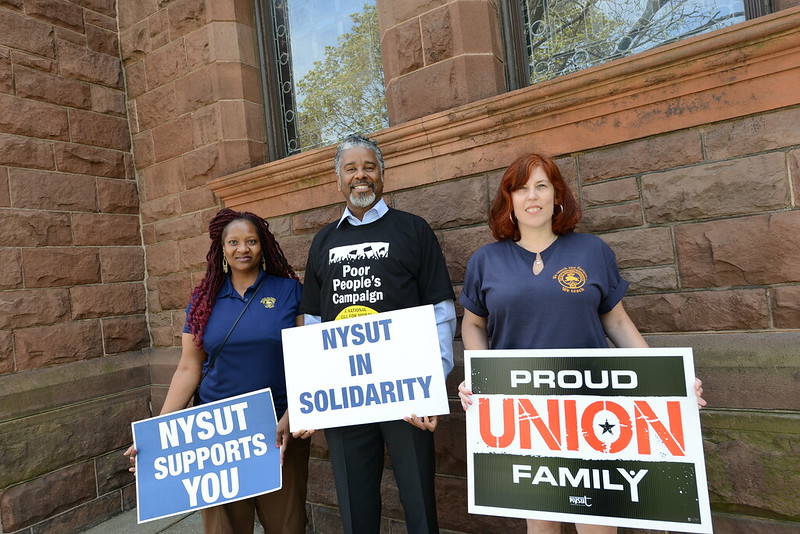Hundreds of activists hoisted tall posts with fluttering, yellow fabric signs as they marched Albany streets Monday for the kickoff of the Poor People’s Campaign, A Call for Moral Revival.
Alongside the marchers, who gathered on the lawn at the Capitol, a homeless man collected bottles in a shopping cart, tucked in with his belongings. Several others ringed the park.
The march aimed to call attention to: people with disabilities who are underserved; farmworkers who labor seven days a week terrified of being deported; people working three jobs but are handcuffed by low wages that can’t meet their basic needs; people with mental health issues who are losing services. Marchers also clamored against corporate greed, power by the few, attacks on the middle class, outsourcing, and a federal administration taking away programs — all of which they noted are major contributing factors to the upsurge in the nation’s poverty.
“It’s an all-out assault on the poor every time (President Trump) diminishes programs,” said J. Philippe Abraham, NYSUT secretary-treasurer who oversees social justice, as he sat in church with others who gathered for Monday’s march.
People in 36 states gathered at state capitols to kick off the Poor People’s Campaign, which has a roster of events slated for the next 40 days across the country, including many in New York. The Call for Moral Revival, meanwhile, will last much longer — slated to stretch several years. It is fashioned after the campaign begun by Dr. Martin Luther King.
High school science teacher Eve Shippens, a member of the Buffalo Teachers Federation, traveled 290 miles by bus with a group of people, willing to share her voice and energy because of the despair she witnesses.
“Childhood poverty is just astronomical in Buffalo,” she said. “As teachers, we’re expected to do a lot with little resources. Families are working so much they can’t be there (for their kids), or they’re struggling. Kids are not coming to school, they’re hungry, and they’re lacking personal hygiene products. They’re coming to school feeling angry. A lot of students, when they get older, they turn to criminal activity to supplement income.”
A member of NYSUT’s human and civil rights committee, Shippens believes “it’s very important to get unions actively involved in campaigns like this, to take a leadership position. We’ll go a lot further and a lot faster. It’s about building bridges where there were no bridges before.”
People of faith, whose religions may not sanction gays, can build bridges with people who identify as LGBQT, she said. It’s about respect for humanity.

Sophia Howard Johnson, a Buffalo kindergarten teacher and NYSUT member, said her goal for the movement is to encourage more minority teachers to get involved in union activism, and to educate them about campaigns and rallies such as this one. Her fire, she said, came after learning how decades ago, black people were not allowed to be a part of unions. Now, she is chair of the ethnic minority involvement for the Buffalo Teachers Federation.
Melanie Pores, a retired teacher from the Albany Public School Teachers Association who came to the rally, said she was there in hopes of encouraging other retirees to get involved with the Poor People’s Campaign.
“Our world is going in a direction I don’t feel is just,” she said. “The few control the lives of the majority of us.”
“We have way too many people across the state that are being systematically oppressed,” said Paul Pecorale, NYSUT second vice president. “The poor keep getting more marginalized by food stamp cuts, Medicare/Medicaid cuts, cuts to basic health care. There is an increase in homelessness because of day-to-day costs. The suffering is happening in every community of this state and we need to make sure that the voiceless have a voice by being a part of this campaign.”
People in the crowd picked up songs and parts of songs as they marched, talked and were led in song. “We’re gonna’ break through…we’re gonna’ stay true….”
Abraham said that in higher education, adjuncts are financially mistreated. “I know people who are adjuncts who are on public assistance, with no health coverage, who work at different colleges. Yet they’re trying to improve others through education.”
Abraham returned just last week from four days in Puerto Rico, where AFT leaders held meetings in San Juan to boost the economy and to bring needed supplies. Many people there are still without electricity and water, he said. Many of them have “not even the most basic hygiene products, underwear, socks, T-shirts or books.”
While on the storm-ravaged island, Abraham and his colleagues filled bags with needed supplies from AFT and from First Book, Inc.
Emily McNeill, director of the Labor-Religion Coalition of New York State which is helping to organize the Poor People's Campaign, pointed out that New York has the worst income equality in the country, with 3 million people living in poverty while the wealth of 109 New York billionaires soars.
“Somebody’s hurting our people and it’s gone on far too long,” the crowd sang out. “And we won’t be silent anymore….”